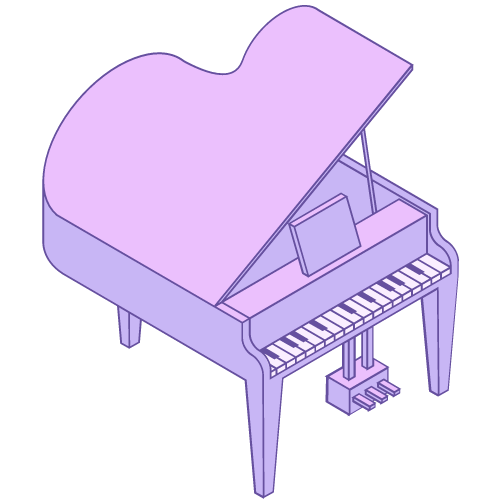Blog
How to Practice Piano Effectively and See Quick Results
Learning to play the piano requires consistent effort, patience, and the right approach to practice. Many beginners, and even experienced pianists, struggle to see progress despite putting in hours of practice. The key to making noticeable improvements in your playing lies not just in the quantity of your practice, but in the quality and methods you use. By practicing effectively, you can accelerate your learning and achieve quicker results. In this guide, we’ll explore how to practice piano effectively and give you the tools you need to see quick progress.
1. Set Clear Goals for Each Practice Session
One of the most common mistakes beginners make is practicing without a clear goal in mind. Without a focus, it’s easy to waste time on random exercises or repeat mistakes without improving.

How to Avoid It:
- Define your objectives: Before each practice session, decide what you want to work on. For example, “I will practice the first section of my song at a slower tempo” or “I’ll focus on improving my left-hand technique.”
- Break down larger goals: If you’re working on a complex piece, break it into smaller sections and focus on mastering one section at a time.
- Track your progress: Keep a practice journal to monitor your progress. Write down what you worked on, what improvements you noticed, and areas that need further work.
Why It’s Important: Having clear, achievable goals helps you stay focused and motivated, and it provides a roadmap for improvement, making practice more effective.
2. Focus on Technique First
Many beginners dive into playing songs they love before focusing on developing the correct technique. While it’s exciting to play your favorite tunes, playing with poor technique can lead to bad habits and slow progress.
How to Avoid It:
- Practice scales and exercises: Scales, arpeggios, and technical exercises are essential for building finger strength, dexterity, and coordination. Make these a regular part of your practice routine.
- Slow down to focus on form: Playing too fast can cause you to overlook key aspects of your technique. Always practice slowly and deliberately to ensure proper hand position, finger movement, and wrist alignment.
- Watch your posture: Ensure that you are sitting comfortably with your back straight and your arms at the right height relative to the keyboard. Poor posture can lead to tension and fatigue.
Why It’s Important: Developing strong technical skills lays the foundation for playing more complex pieces and helps prevent injuries or strain in the long run.
3. Practice in Small, Manageable Segments
It’s easy to become overwhelmed when trying to learn an entire piece at once. When you tackle a difficult piece, it’s essential to break it down into small, manageable sections.
How to Avoid It:
- Chunk the music: Divide the piece into smaller phrases or sections and focus on mastering one at a time. Once you’ve mastered each section, you can begin to put them together.
- Practice hands separately: If the piece involves complex hand coordination, practice each hand separately until you’re comfortable. This allows you to focus on one part at a time and develop muscle memory more effectively.
- Repeat difficult sections: When you encounter a challenging section, repeat it several times slowly and deliberately until you can play it without mistakes.
Why It’s Important: Breaking pieces into smaller sections helps you focus on detail, ensuring that you don’t become frustrated by trying to learn the entire piece all at once. It also helps you make fewer mistakes, as you can focus on each element individually.
4. Use a Metronome for Timing and Rhythm
Rhythm is the backbone of music, and many beginners struggle with staying in time. Practicing with a metronome is one of the best ways to improve your sense of timing and rhythm.
How to Avoid It:
- Start slow: Begin practicing pieces at a slower tempo to ensure you can play accurately and evenly. Once you’re comfortable, gradually increase the tempo.
- Focus on precise timing: Set the metronome to the beat of the song (e.g., quarter notes or eighth notes) and make sure every note you play aligns with the click.
- Use different time signatures: If the song has a more complex time signature, use the metronome to practice staying on beat with the correct rhythmic structure.
Why It’s Important: A metronome helps develop your timing, which is essential for playing music in a consistent and professional manner. Playing without good timing can make even the most technically perfect piece sound offbeat and disjointed.
5. Slow Down and Focus on Accuracy, Not Speed
While it’s tempting to speed through a song, especially when you’re excited about playing it, speed should always come after accuracy. Playing too fast can result in mistakes and reinforce bad habits.

How to Avoid It:
- Practice slowly: Start every new piece at a slow tempo and focus on playing each note correctly. Only increase the tempo when you are confident in your accuracy.
- Use the “one hand at a time” rule: When learning a new section, start by practicing one hand at a time to ensure you are playing the notes correctly. Once both hands are comfortable, combine them.
- Take breaks: If you feel yourself getting tired or frustrated, take short breaks. Practicing while fatigued can lead to sloppy playing and reinforce mistakes.
Why It’s Important: Practicing slowly ensures you’re building proper technique and muscle memory, which is essential for faster playing later. Accuracy is key—playing fast with mistakes is less effective than playing slowly with precision.
6. Use Repetition for Mastery
Repetition is one of the most powerful tools for learning. If you want to master a piece or technique, repeating it regularly is the best way to ensure you remember it and can perform it consistently.
How to Avoid It:
- Repeat difficult passages: Isolate tricky sections and repeat them until you play them correctly. Gradually increase the speed while maintaining accuracy.
- Practice in varied ways: Try playing a difficult section backwards, or change up the fingering to ensure your muscle memory is truly solid. You can also practice with dynamics or articulation variations to keep the practice interesting.
- Use mental practice: Even when you’re not at the piano, mentally run through sections of your music. Visualize your fingers on the keys and the movement required to play each note.
Why It’s Important: Repetition reinforces muscle memory and helps the music become second nature. The more you repeat a passage, the more easily you’ll be able to play it correctly without thinking.
7. Record Yourself Playing
Recording your playing is a great way to assess your progress, identify mistakes, and refine your technique. Listening to yourself can highlight areas that need attention and give you a fresh perspective on your performance.
How to Avoid It:
- Record regularly: Make it a habit to record parts of your practice sessions, even if it’s just a short section.
- Listen critically: Listen carefully to your recordings and take note of areas where you’re making mistakes or where your timing feels off.
- Compare progress: Record yourself regularly and compare the recordings to track your improvement over time. This will motivate you to keep going.
Why It’s Important: Recording allows you to objectively evaluate your playing, which is difficult to do while you’re focused on the keys. It helps you pinpoint areas for improvement and track your development.
8. Stay Consistent and Practice Every Day
Consistency is the key to improvement. It’s better to practice for 30 minutes every day than to practice for 3 hours once a week. Consistency helps build muscle memory and keeps your mind fresh.
How to Avoid It:
- Create a routine: Schedule practice sessions at the same time each day to make it a habit.
- Break it up: If you’re pressed for time, split your practice into two or three shorter sessions throughout the day. A little bit every day is more effective than a long session every now and then.
- Stay motivated: Find ways to keep your practice enjoyable, whether it’s playing pieces you love or setting small challenges for yourself.
Why It’s Important: Practicing regularly ensures that you keep building on your skills, prevents you from forgetting what you’ve learned, and keeps you motivated to continue progressing.
9. Avoid Multitasking While Practicing
It’s tempting to practice while distracted, such as watching TV or talking to someone, but multitasking can hurt your progress. Focused, undistracted practice is the most effective way to learn.
How to Avoid It:
- Turn off distractions: Try to practice in a quiet, focused environment. Put your phone on silent or in another room, and dedicate your full attention to the piano.
- Concentrate on one thing at a time: If you’re working on a specific skill, like sight-reading or a new piece, focus solely on that. Multitasking can slow down your progress and prevent you from noticing mistakes.
Why It’s Important: Focused practice leads to better results because your brain can absorb and process information more effectively when you give it your full attention.
10. Be Patient and Stay Positive
Learning the piano is a long-term journey, and there will be moments of frustration along the way. It’s easy to get discouraged when progress seems slow, but staying positive and patient is key to success.
How to Avoid It:
- Celebrate small wins: Acknowledge even small improvements, whether it’s mastering a new scale or playing a piece without mistakes.
- Don’t rush: Understand that improvement takes time. Be patient with yourself and enjoy the process.
- Stay motivated: Keep your goals in mind, and remember why you started learning in the first place. Play music that inspires you to stay excited about your practice.
Why It’s Important: A positive mindset and patience are essential for long-term success. Progress may be slow at times, but perseverance and a positive outlook will keep you moving forward.
Conclusion: Practice Smart, Not Hard
Effective practice is about working smarter, not harder. By focusing on specific goals, mastering technique, breaking down difficult passages, and being consistent, you can see faster progress in your piano playing. Remember to be patient with yourself, enjoy the process, and celebrate your milestones along the way. With the right approach, you’ll find yourself playing better than ever and achieving your musical goals more quickly.


